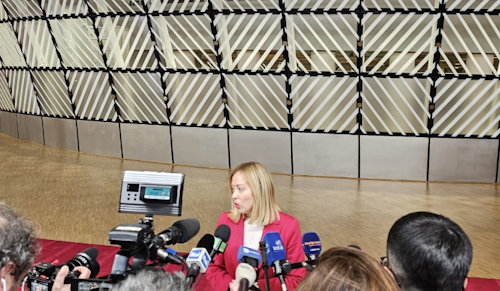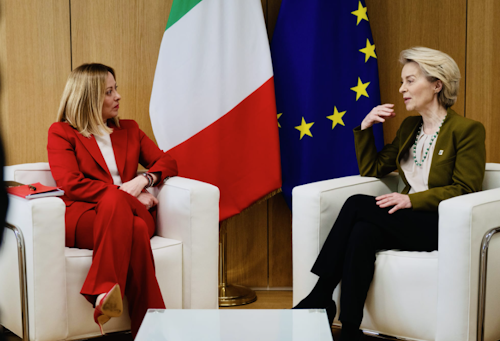The summit touched upon a wide range of issues, including Russia's war on Ukraine, competitiveness, migration, defence policy and the next EU budget.
Ukraine and defence overshadowed the main topics on the agenda of the leaders' summit in Brussels on Thursday with Hungary once again refusing to endorse a joint text on continuing military support to the war-torn country.
Leaders were primarily meant to discuss the bloc's competitiveness issues and how to remedy them and start discussions on the next multi-annual budget but those topics were eclipsed by the latest developments in the Ukraine war and the proposals by the Commission to give member states the means to significantly boost defence spending.
The executive's plan includes the relaxation of fiscal rules to unleash up to €650 billion in additional defence spending and a novel programme of €150 billion in low-interest loans that will be financed through common borrowing.
But for some capitals, loans are not enough.
Spain, Italy, Greece, Poland and the Baltic states are among those calling for grants, as the bloc did during the COVID-19 pandemic. Unlike loans, which are re-paid individually by the governments that request them, grants would be re-paid collectively by the 27 member states, alleviating the burden on those who need the money the most.
The Netherlands, however, remains adamantly opposed to any mention of grants, insisting the €150-billion programme of loans is the maximum it would tolerate.
Meanwhile, High Representative Kaja Kallas is struggling to keep afloat her ambitious initiative to raise up to €40 billion in military support for Ukraine, a number that, if achieved, would represent a two-fold increase from the aid delivered last year.
Relive the events of the day in the live-blog below:

 ${title}
${title}
Live ended
The Kallas plan flounders at EU summit
The plan devised by High Representative Kaja Kallas to raise up to €40 billion in fresh military support for Ukraine failed to gain the necessary political traction during the summit, throwing its viability into serious doubt. The reaction was so lukewarm that some diplomats went as far as declaring the project "dead".
The summit's conclusions dedicated to Ukraine, endorsed as an "extract" by just 26 countries over Hungary's veto, only made a passing reference to the Kallas plan, without mentioning any financial figures.
"The European Council recalls the initiatives to enhance EU military support to Ukraine, notably that of the High Representative to coordinate increased support by member states and other participating states, a voluntary basis," the text reads.
The conclusions do not even include what Kallas described as the most "realistic" element of her project: €5 billion to procure 2 million ammunition rounds for Kyiv in the short term. Artillery shells are cheaper and easier to acquire than advanced weapons.
"I think it is important to have a tangible result," Kallas said on Thursday morning. "If we are not able to decide right now for the whole year that is coming, let us decide on the short term which are the imminent needs that Ukraine has regarding the ammunition right now."
With this story, we conclude our live blog. Thank you for reading.
Kaja Kallas’ €40-billion plan for Ukraine flounders at EU summit
After a summit in Brussels, EU leaders did not endorse the target to mobilise €5 billion to procure 2 million ammunition rounds for Ukraine. #EuropeNews
Von der Leyen replies to Sánchez's 'rearm' criticism
During the closing press conference of the EU summit, Ursula von der Leyen was asked about Pedro Sánchez's critical assessment of her "Rearm Europe" plan.
"I don't like the term 'rearm', I think it reflects an incomplete approach. Defence can be understood under a much broader umbrella, which is security," the Spanish prime minister told journalists. Sánchez then doubled down on his request to include expenses related to counter-terrorism, the fight against climate change and other issues in the framework of security investments.
Italian Prime Minister Giorgia Meloni had previously voiced similar reservations.
Asked if she was willing to rebrand her €800-billion blueprint, the president of the European Commission said the concept had started "relatively narrow" but had "grown or matured to Readiness 2030," a new term that her executive used earlier this week to present the White Paper on Defence.
"It's a much wider scope, the approach that we're taking and therefore the name Readiness 2030," she said.
Von der Leyen spoke of infrastructure, military mobility, modern electronic warfare, cyber security, telecommunications and natural disasters as areas that would be covered by "Readiness 2030."
Costa and von der Leyen to update allies on summit discussion tomorrow
Ursula von der Leyen and Antonio Costa will chair a virtual meeting with leaders of allied third countries on Friday afternoon to brief them on the discussions EU heads of state had on Ukraine.
The UK, Turkey, Norway and Iceland will take part in the meeting, an EU official has confirmed.
Participants from New Zealand, Japan, and Australia were also invited to join but won't be able to because of conflicting schedules and time zones, the official added.
The EU 'will have to take another loan': Macron
The French president was also asked about Eurobonds for defence for which he reiterated his support, noting however that "today, this is not at all consensual" among the 27 leaders.
He told reporters he has discussed the topic with Germany's chancellor-in-waiting, Friedrich Merz, which he saw on Tuesday in Berlin, but that it was "early to say" whether his government would swing behind the proposal.
Germany is traditionally described as a so-called frugal country, championing fiscal responsibility and against the issuing of new common debt of the types done during the COVID pandemic. But Denmark, another frugal, has expressed willingness to look into Eurobonds to finance the ramp-up in defence production the bloc needs to be able to protect itself by 2030.
Macron said he is "all too aware that if you go for an instrument, that's where you create unnecessary divergences".
"But you don't have to be a rocket scientist to know that this is a debate that will come up very quickly. I'm in favour of it because when you look at the eurozone as a whole compared with the United States, we are very, very underleveraged," he added.
Paris to host summit of the coalition of the willing on Ukraine next Thursday: Macron
French President Emmanuel Macron told reporters before leaving the summit that a "summit of the coalition of the willing" is to be held next Thursday in Paris that Ukraine's Volodymyr Zelenskyy will attend.
"We are finalising our work (on) short-term support for the Ukrainian army, the defence of a sustainable Ukrainian army model to prevent Russian invasions, and the security guarantees that European armies can provide," he said.
He nonetheless stressed that "we're a long way away that" since "we haven't yet seen the beginning of a ceasefire".
"We've done a lot of work with the British on the conditions for the ceasefire. And I think this will be an opportunity to discuss it, to specify it, which is important to give credibility to any ceasefire at the time it takes place, and the objective is also to specify the different levels of support for Ukraine after peace" including for the Ukrainian army and the "possible deployment" of peacekeeping troops.
"It's important to show that there's something credible to reassure our Ukrainian friends and to have a strong negotiating position," Macron added.
Photo credit: AP Photo/Geert Vanden Wijngaert
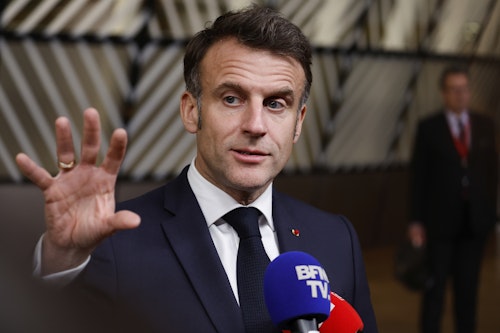
Sánchez: 'I don't like the word 'rearm''
"I don't like the term 'rearm', I think it reflects an incomplete approach. Defence can be understood under a much broader umbrella, which is security," Spanish Prime minister Sánchez told journalists after the end of the summit.
Sánchez doubled down on his request to include expenses related to counter-terrorism, the fight against climate change and other issues in the framework of security investments.
"The threats on Southern Europe are somewhat different from those in Eastern Europe. In our case, they are related to cybersecurity, hybrid threats: what we need to do is improve our cybersecurity capabilities, counterterrorism efforts, security in the Mediterranean, satellite connections, quantum computing, AI, and their implications for national security," he said.
Sánchez said he is satisfied of the European Commission's approach to discuss the defence issue and praised the SAFE instrument, one of the pillars of ReArm Europe plan, calling it "a clear bet on European defence industry".
Lithuania president requests 'additional help' for Eastern countries
The Lithuanian president has welcomed the ReArm Europe package that Ursula von der Leyen proposed to mobilise up to €800 billion in defence spending. But, he added, member states of the Eastern flank that are most vulnerable to Russian aggression should receive "additional" support, without specifying which kind.
"The time for Europe to act is now," Gitanas Nausėda wrote just now on social media. "Every member state should invest at least 3 percent of GDP, with those on the frontline receiving additional help."
The time for Europe to act is now.
— Gitanas Nausėda (@GitanasNauseda) March 20, 2025
The ReArm Europe plan by @vonderleyen provides the EU with the best option for getting our defences up and running.
Every 🇪🇺 member state should invest at least 3 percent of GDP, with those on the frontline receiving additional help. pic.twitter.com/oHqVtZX6mC
EU summit is over
The meeting of the European Council has come to an end, we just heard.
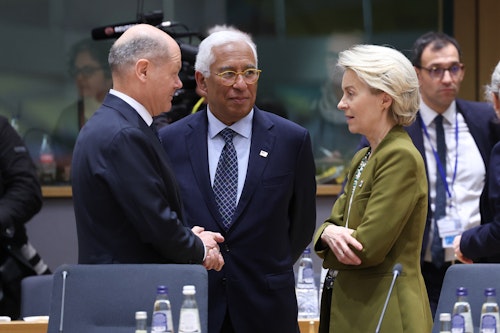
Plans for security guarantees for Ukraine 'coming together': Starmer
While EU leaders are in Brussels, military planners from a so-called coalition of the willing were in London on Thursday to continue talks on how to support Ukraine if a peace deal is agreed between Kyiv and Moscow.
British Prime Minister Keir Starmer, in his remarks to planners, said that peace in Ukraine will only be lasting if the country is secure and sovereign and "if there are security guarantees in place to ensure that if there is a deal, it is a defended deal".
"Those plans are coming together, and I met some of the team to work through some of the details," he said.
Starmer has chaired two summits of Western leaders over the past two weeks, either physically or virtually, with other similar summits convened earlier by France's President Emmanuel Macron. The flurry of diplomatic meetings was triggered by Donald Trump's decision to move forward with talks with Russia while sidelining Europe in the process.
Macron already presided over a gathering of military chiefs of staff last week.
The French and British leaders are in lockstep over security guarantees for Ukraine and have both expressed their willingness to deploy troops in Ukraine as part of a peacekeeping mission.
Starmer told planners that a plan is needed because "a deal without anything behind it is something that Putin will breach".
"I’m well aware that the deal may be in stages, and therefore there is a different optionality, different things that have to be planned, but the more planning that we do here now through you, the better," he added.
What did EU leaders say about migration?
Migration is always high in the EU's political agenda and today was no exception. However, the discussion on migration was very brief and essentially served as a recap of the main points that we have heard from the past few months.
EU leaders highlighted the need to keep exploring "new ways" to curb irregular migration, a vague term often associated with outsourcing procedures. The European Commission recently proposed a new regulation that envisions exactly this option to build deportation centres outside the bloc's border to transfer rejected asylum seekers. Leaders welcomed this proposal and urged the Council and the Parliament to "swiftly" advance work to approve it, signalling broad support behind the unprecedented move.
The conclusions also include references to EU-funded deals with neighbouring countries to curb irregular departures of asylum seekers, the revision of the safe third country concept to speed up deportations and the fight against instrumentalised migration and human trafficking.
EU lays groundwork for deportation centres in distant countries
The new regulation on deportations represents the first tangible result of the outsourcing trend that EU leaders endorsed last year. #EuropeNews
Meloni urges caution on tariffs, cites growth risks
In her brief doorstep statement ahead of the dinner, Giorgia Meloni also touched on the issue of retaliatory actions against US tariffs, urging caution in the EU’s response.
“You have to be careful with automatic reactions because I’m concerned about the consequences,” she said. “Tariffs create an inflationary push that could lead to higher European Central Bank rates, which in turn would slow down growth."
She referenced a statistic shared by Christine Lagarde in her speech to leaders, previously reported in this liveblog, in which the ECB governor warned that the EU growth could contract by 0.3% and up to 0.5% if the EU retaliates with tariffs. “This confirms that we need to be mindful of how we respond,” Meloni said.
She also praised European Commission President Ursula von der Leyen for taking time to assess the potential consequences with more data.
When asked about a possible trip to Washington to meet Donald Trump, Meloni confirmed she plans to go, but doesn’t yet know when.
Leaders' conclusions call for 'acceleration' in Europe's defence readiness
Leaders have adopted conclusions on defence in which they collectively call for an "acceleration of the work on all strands to decisively ramp up Europe's defence readiness within the next five years".
The Commission in its ReArm Europe plan, also called 'Readiness 2030', and in its White Paper, unveiled a number of instruments meant to tempt member states into pooling financing and demand to boost defence production and spending. The financing options put forward, which include a relaxation of fiscal rules and issuing bonds backed by the EU budget to offer low-interest loans to member states, meanwhile plan for governments to invest up to €800 billion in the sector over the coming four years.
Leaders in their conclusions also called for "the implementation of the actions identified in its conclusions of 6 March 2025 in the field of capabilities to start as a matter of urgency and for continued work on the relevant financing options".
The White Paper, released on Wednesday, did not offer any new funding options than the ones already proposed earlier this month in ReArm Europe, but several countries like France, Greece, Italy, and Spain have called for so-called Eurobonds to be issued to provide grants to member states.
"The European Council invites the Commission and the High Representative to report regularly on progress made in the implementation of its conclusions on defence. It will revert to all strands of work on this issue at its next meeting," the conclusions also say.
The next summit is scheduled for late June, after a gathering of NATO leaders.
Donald Tusk leaves the sumit
Donald Tusk, the prime minister of Poland, has just been seen leaving the summit.
It comes as leaders adopt joint conclusions on defence, a key priority for his country.
Leaders discuss defence over a light dinner
Serious discussions on defence and EU budget for tonight, but a menu that keeps things light.
The meal started with an entrée of salsify (that’s an edible root) served with mousseline sauce (a summit classic, basically Hollandaise with a whipped cream upgrade).
For the main course, they are having turbot (delicate flat fish) accompanied by a carrot jus reduction. And for dessert? Once again, no sweets! Instead, a fresh fruit selection featuring avocado, mango, and lime.
Europe is moving in the right direction on competitiveness (but not quickly): Meloni
Italy’s Prime Minister Giorgia Meloni gave a brief doorstep statement before dinner, pointing out that while Europe is not progressing rapidly on competitiveness, it is heading in the right direction.
She highlighted positive developments for Italy, particularly the EU's simplification agenda. Rome has requested that the European Commission reduce bureaucratic burdens by at least 25% this year, a move Meloni sees as a step forward.
Meloni also welcomed the summit’s conclusions overall, but particularly the mention of Italy’s proposal to use InvestEU funding for the defence plan. This would prevent national budgets from shouldering the full cost of defense spending while providing European guarantees for private investment, she said.
She stressed that these guarantees should not be mistaken for eurobonds, though she added: “For me, one can also discuss them, but that is not Italy’s proposal today.”
Regarding the €150 billion in loans proposed by European Commission President Ursula von der Leyen, Meloni said Italy has yet to make a decision.
“It is not an Italian refusal of loans, but a choice we need to evaluate. Some details are still under discussion, and until we have clarity, I cannot give an answer.”
Zelenskyy's intervention to leaders not done in 'friendly manner': Orbán
Hungarian Premier Viktor Orbán said that he vetoed the joint conclusions on Ukraine to protect Hungarian families from "paying the economic consequences of the war" and accused Volodymyr Zelenskyy of "suffering from role confusion".
In a video posted on X, Orbán claimed that the war in Ukraine had so far cost every Hungarian household 2.5 million forints (€6,272) and that he "must put a stop to this".
Putting an end to this, he added, "only be achieved by convincing Europe to support the efforts of the President of the United States for peace, rather than engaging in war adventures. Only then will there be peace."
"We couldn't convince each other, and I vetoed the common position," he said.
The other 26 leaders however all endorsed conclusions on Ukraine, in which they say the bloc "maintains its 'peace through strength' approach" and call on member states to "urgently step up efforts to address Ukraine's pressing military and defence needs."
Orbán also said of Zelenskyy's intervention: "I wouldn't say he did it in a friendly manner. The President of Ukraine seems to be suffering from a role confusion, acting as if he were already in the European Union and, therefore, could afford a sharper tone, when in fact, he cannot. He is an applicant who wants to join the European Union."
The Hungarian leader said he will only move from his current position after the Hungarian people have been consulted on Ukraine's wish to join the EU. Ukraine's accession bid is stalled as Hungary is blocking the opening of talks for the first clusters of chapters, which requires the unanimous backing of all 27 member states.
"Right now, we are asking the people of Hungary for their opinion on Ukraine's membership, and no matter how much President Zelenskyy pressures us or even turns on his head, as long as we do not know the Hungarian people's opinion, I cannot support him here," Orbán said.
❌ Veto! Enough is enough! We will ask the Hungarian people about the EU-membership of Ukraine. We cannot support any common position on this matter until then. pic.twitter.com/Mvlf7jKrI9
— Orbán Viktor (@PM_ViktorOrban) March 20, 2025
Dinner begins
EU leaders are about to begin their dinner.
Two topics will be on the (political) menu:
- The new plans to rearm the bloc, worth up to €800 billion.
- A first discussion on the 2028-2034 budget.
No written conclusions will be published about the budget, as the process is still in the very early stages.
Will it be a one-day or two-day summit?
Will the EU summit last one or two days?
This is what officials, diplomats and, most importantly, journalists have been wondering for the past few days. The meeting in Brussels comes with a remarkably busy agenda: Ukraine, Russia, defence, the economy, migration, the common budget, oceans, multilateralism, etc... So the anticipation was to have a two-day summit stretching into Friday afternoon.
But as we've been hearing, the talks are moving at a resolute pace, without any delays or controversies, which has diplomats (and journalists) in the room increasingly hopeful that the summit will, indeed, last just one day. Stay tuned...
Meloni making (unusual) friends
Spanish Prime Minister Pedro Sánchez voiced his “principled objection” to the term 'rearm' in the European Commission’s plan to strengthen Europe’s defence, speaking at the EU summit's doorstep this morning, as previously reported by Euronews.
He reiterated his stance during discussions with other leaders, a diplomat confirmed to Euronews.
Sánchez’s remark was particularly well received by Giorgia Meloni, the source continued, as Italy's Prime Minister had already pushed for a change in terminology during the extraordinary summit two weeks ago.
Meloni considers the term rearm “misleading”, arguing that the plan is not about purchasing new weapons but rather about boosting production, enhancing operational infrastructure, and improving other essential defence services.
Leaders' conclusions on Gaza-Israel 'shameful': Amnesty International
Amnesty International has blasted the common text leaders agreed on regarding the situation in Gaza, describing it as a "shameful attempt to justify Israel’s genocide and war crimes against Palestinians".
In the conclusions, leaders say they "deplore the breakdown of the ceasefire in Gaza which has caused a large number of civilian casualties" and "the refusal of Hamas to hand over the remaining hostages". They also called for the "immediate return to the implementation of the ceasefire-hostage release agreement" and the "unimpeded access and sustained distribution of humanitarian assistance" into Gaza.
The NGO reacted in a statement saying: "After 17 months of Israel's genocide in Gaza, the fact that the EU refuses to name Israel, condemn air strikes wiping out entire families or condemn Israel’s blocking of vital humanitarian aid is extraordinary."
"The EU’s position not only fails to reflect the EU’s professed commitment to international law, but also demonstrates selective compassion towards victims, particularly when they are Palestinian."
"EU leaders should take clear and decisive action to prevent potential complicity in Israel’s genocide in Gaza, apartheid and unlawful occupation. For too long the EU has been divided on how to respond to Israel’s genocide in Gaza, with some member states continuing to send weapons and ammunition to Israel in breach of their obligations to prevent genocide and ensure respect for the Geneva Conventions. This must end now," Amnesty added.
Pre-summit meeting on migration focused on return regulation
The informal meeting on migration issues that took place before the summit, led by Italian Prime Minister Giorgia Meloni, Dutch Prime Minister Dick Schoof, and Danish Prime Minister Mette Frederiksen, focused on a recently proposed regulation that lays the groundwork for building deportation centres outside the EU, according to diplomatic sources.
Meloni expressed her support for a prompt discussion and approval in the Council and in the European Parliament, and asked for rapid developments on a European common list of safe countries of origin where the EU countries should be able to send back irregular migrants. This list is foreseen by June.
According to the same sources, leaders expressed appreciation for the work carried out by von der Leyen and agreed to keep their contacts in view of the June European Council.
The meeting included European Commission President Ursula von der Leyen, plus the leaders of Austria, Belgium, Cyprus, Greece, Hungary, Latvia, Malta, Poland, Czech Republic and Sweden.
This format, fairly typical before summits, was joined for the first time by Bart De Wever, Belgium's new prime minister, who is the leader of the sovereignist New Flemish Alliance party which sits in the European Conservatives and Reformists party, the same as Meloni's Brothers of Italy.
The question around the summit: Is the Kallas plan dead?
The summit has so far played with little to no controversy. But there's one topic that is attracting significant attention from eager journalists waiting in the big hall: the Kallas plan.
As Euronews reported last week, High Representative Kaja Kallas has pitched an ambitious plan to mobilise up to €40 billion in fresh military support for Ukraine, which, if achieved, would represent a twofold increase from the defence assistance that the EU provided last year.
But while the need to ramp up support for Ukraine is widely shared across the bloc, the Kallas plan has failed to convince all member states.
Kallas has proposed that a "portion" of the military contribution be done "in line" with each country's "economic weight," using gross national income (GNI) as the chief indicator to ensure a fair distribution of donations. This model has been met with great resistance from big countries, like France and Italy, who, under the GNI key, would be expected to put forward sizable contributions. Meanwhile, other countries have raised questions about how national pledges would be taken into account and how many non-EU countries would be added to the common pool of military assistance.
Countries are also pushing for answers on how the plan integrates the €18 billion that the EU will supply Kyiv as part of an extraordinary loan backed by the windfall profits of Russia's frozen assets. There is an additional question on how effective the project might be in practice if, from the beginning, it is built as a voluntary scheme to bypass Hungary's and Slovakia's vetoes.
The long list of question marks has led some diplomats to declare the plan effectively "dead," pointing the finger at Kallas herself for rushing a badly conceived proposal. Other diplomats argue the plan could still be salvaged by removing the GNI indicator and focusing on Ukraine's immediate needs for additional ammunition, which is cheaper than other advanced weapons.
Read more about the Kallas plan.
Kallas pitches plan to raise €40 billion in military aid for Ukraine
The new initiative by Kaja Kallas is facing unresolved questions and political resistance that threaten to slow down its approval and roll-out. #EuropeNews
Norway to triple assistance to Ukraine, Zelenskyy says from Oslo
Ukrainian President Volodymyr Zelenskyy had a "very warm, meaningful, and productive meeting" with Norwegian Prime Minister Jonas Gahr Støre after dialling in to address EU leaders in Brussels.
He said Norway has committed to "nearly triple the volume of assistance to Ukraine, bringing it to nearly $8 billion (€7.3 billion)". He added that the funds would be "directed toward the procurement and production of drones, shells, and artillery" to help Ukraine "ultimately force Russia to shift toward a diplomatic path to ending the war".
Zelenskyy also reiterated that "all nuclear power plants belong to the people of Ukraine," in reference to the Zaporizhzhia power plant. US President Donald Trump had earlier suggested that he is considering giving the US ownership of Ukraine’s power plants to ensure their long-term security.
"President Trump asked me what I thought about the plant," Zelenskyy told a press conference following his meeting with Støre. "I told him that if it is not Ukrainian, it will not operate for anyone else. It is illegal. We can't just dispose of this plant because it's state-owned."
I had a very warm, meaningful, and productive meeting with Norway’s Prime Minister @jonasgahrstore. Throughout all three years of this war, Norway has stood firmly by our side – the side of protecting life – and all Ukrainians deeply appreciate it.
— Volodymyr Zelenskyy / Володимир Зеленський (@ZelenskyyUa) March 20, 2025
Today, the Prime Minister and… pic.twitter.com/0pUwxFDN9D
EU leaders discuss competitiveness
The 27 leaders are well into their discussion on competitiveness, which has become a maximum priority for all heads of state and government, regardless of political affiliation.
The bloc is currently working on different plants to alleviate the administrative burden for companies, simplify regulation, unleash the potential of savings and mobilise fresh money into strategic priorities. The discussion on competitiveness has become closely linked, or even intertwined, with the discussion of defence policy, as ramping up the production of weapons and ammunition is an industrial activity that leaders hope will generate growth and jobs.
Photo Credit: European Union.
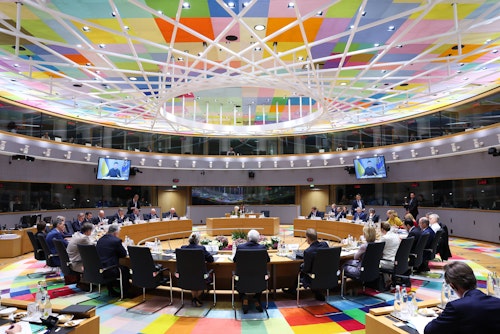
EU leaders deplore breakdown of ceasefire in Gaza
EU leaders have just adopted their conclusions on the Middle East, with a prominent paragraph about the latest developments in the Gaza Strip.
Earlier this week, Israel launched a surprise attack on the enclave, killing more than 400 Palestinians. Israel said the strikes were in response to Hamas' refusal to release the remaining hostages. Hamas wanted to trigger the second phase of the ceasefire, where all hostages would be released in exchange for a permanent end of hostilities. But the second phase never happened.
The strikes effectively put an end to the fragile agreement.
"The European Council deplores the breakdown of the ceasefire in Gaza, which has caused a large number of civilian casualties in recent air strikes. It deplores the refusal of Hamas to hand over the remaining hostages," EU leaders say in their conclusions.
"The European Council calls for an immediate return to the full implementation of the ceasefire-hostage release agreement. It stresses the need for progress towards its second phase, with a view to its full implementation leading to the release of all hostages and a permanent end to hostilities"
The conclusions also call for the "unimpeded access and sustained distribution of humanitarian assistance" into Gaza and the immediate restoration of electricity supplies, which Israel has cut.
Photo credit: Associated Press.
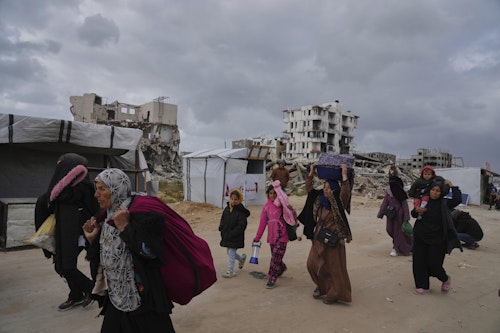
The Netherlands won't budge on increased borrowing for now
While a majority of European leaders have embraced the ReArm Europe plan for defence spending, Dutch Prime Minister Dick Schoof entered discussions today with some uncertainty on his country's position.
Schoof had previously expressed support for the joint action plan to allow for increased defence spending, but is facing increasing internal pressure from his coalition partners back in The Hague. The Dutch are traditionally resistant to increased borrowing under any circumstances, but the seeming refusal to budge on their position may make matters more difficult for Schoof in Brussels.
Last week, Schoof's coalition parties managed to pass a motion requesting Schoof to "actively resist eurobonds and strictly monitor the compliance with European budgetary rules". It led to strong opposition in parliament, including from centre-right coalition party VVD. A newer version passed earlier this week adopted milder language, but the Dutch position is still unlikely to budge.
Other traditionally frugal countries, like Denmark and Germany, have already loosened their rigidity on spending, with Germany even agreeing to reform its debt brake in the name of defence. But so far, the Netherlands seems unlikely to follow. "It's not new. It's what we always say," Schoof insisted.
Ukraine's accession would 'destroy' the bloc's economy, says Balazs Orbán
In the current situation, Ukraine's accession would "destroy" the bloc's economy, Balazs Orbán, political director of Hungarian PM Viktor Orbán, told reporters in the Council.
"It's the sovereign right of each member state to decide on the accession, so we need a sort of democratic display of opinion in this matter," he added.
Balazs Orbán said that Hungary will ask its citizens about the issue in a questionnaire.
"Rebuilding Ukraine and the accession will have immense costs. This would cost a lot for Hungary, therefore we can not responsibly support the speeding up of Ukraine's accession," the political advisor argued.
By Sándor Zsíros.
Discussions with Guterres are over, next topic: competitiveness!
Discussions with UN Secretary-General António Guterres on the current geopolitical context and the challenges of multilateralism just finished, an EU official said.
Guterres urged EU leaders to engage with the upcoming 4th International Conference on Financing for Development in Seville, the G-20, COP30 and the World Social Summit.
They also talked about the Russian military aggression against Ukraine, the situation in the Middle East and further opportunities for the EU to "build a network of partners that reflects the current multipolar world".
Next topic on the EU's agenda? Competitiveness. Stay tuned!
ECB's Lagarde: Trade tariffs could push up eurozone inflation
Trade uncertainty poses a significant threat to eurozone growth and inflation, with tariff-driven price pressures expected to intensify, European Central Bank President Christine Lagarde warned on Thursday.
Speaking at a European Parliament hearing, Lagarde acknowledged that while inflation is still on track, heightened trade uncertainty—especially stemming from the United States’ shifting policies—could disrupt the eurozone’s recovery and ignite price increases.
“Trade frictions are detrimental to global growth and welfare,” she said, warning that retaliatory tariffs and supply chain disruptions could lead to higher costs for European businesses and consumers.
A new wave of tariffs, she added, could push inflation up by as much as 0.5 percentage points, complicating the ECB’s efforts to stabilise prices while also dampening economic growth.
Lagarde: Trade tariffs could push eurozone inflation up by 0.5%
A trade war could push up eurozone inflation by half a percentage point alone with detrimental effects on growth, ECB’s Lagarde warns. The ECB president said r…
EU Commission to pitch defence omnibus package in June 2025
The EU's aim to simplify rules and cut red tape will also affect the bloc's defence industry.
The European Commission is planning to present a specific omnibus package for defence by June 2025.
The special simplification regulation will aim to reduce fragmentation within the single market and increase defence production through a simpler and more harmonised regulatory environment for defence products and services.
To this end, the EU executive will immediately launch a strategic dialogue with the defence industry and the private financial sector to discuss possible actions, identify regulatory obstacles and address challenges.
EU to pitch defence omnibus package in June 2025
The EU Commission will present its White Paper on the Future of European Defence by 19 March. #EuropeNews
EU leaders, bar one, reject Putin's demand for a 'complete' halt of military aid to Ukraine
The leaders of the European Union, except one, have rejected Vladimir Putin's demand for a "complete" halt of military assistance to Ukraine as part of the ceasefire negotiations. Putin doubled down on his demand after his phone call with Donald Trump on Tuesday.
But on Thursday, leaders moved to rebuff him.
"The European Union maintains its 'peace through strength' approach, which requires Ukraine to be in the strongest possible position, with its own robust military and defence capabilities as an essential component," the text adopted during the summit says. "It calls on member states to urgently step up efforts to address Ukraine's pressing military and defence needs."
As expected, Viktor Orbán refused to endorse the joint conclusions, forcing the other 26 leaders to release an "extract." Read the full story.
EU leaders reject Putin’s demand to halt military aid to Ukraine
Despite Putin’s demand, the EU insists Ukraine should have “its own robust military and defence capabilities as an essential component.” #EuropeNews
EU’s decision-making needs to be faster, more flexible, Zelenskyy says
European efforts to boost security and peace are constantly being obstructed, Ukrainian president Volodymyr Zelenskyy said on Thursday.
“This is wrong. Europe must have a way to prevent individual actors from blocking what’s necessary for all,” Zelenskyy told EU leaders via videoconference.
“It is simply anti-European when one person blocks decisions important for the entire continent or that have already been agreed upon,” he added, referring to the Hungarian nationalist leader Viktor Orbán expressing his opposition to backing further military support to Ukraine.
Zelenskyy called again on the European chiefs to maintain and increase support for his war-torn country.
“Air defence, military aid, our overall resilience—all are crucial. We need funds for artillery shells and would really appreciate Europe’s support with at least five billion euros as soon as possible,” he stressed.
The Ukrainian leader also argued that some more pressure is needed within the EU itself to ensure that anything promised actually happens, particularly referring to Ukraine’s EU accession talks.
I addressed the European Council and emphasized that if we say Europe should be stronger in global competition, we must also discuss making European decision-making faster, more flexible, more effective – whether in politics, defense, economics, industry, or any other area. pic.twitter.com/TRIPAzYSeR
— Volodymyr Zelenskyy / Володимир Зеленський (@ZelenskyyUa) March 20, 2025
What's on the leaders' menu (literally)
Fine dining with a pinch of fusion for a lunch that sounds like it was conceived for a cooking show rather than the EU summit.
Let's break it down:
-as a fancy entrée, we have kohlrabi, Granny Smith apple (curiously, an apple cultivar coming from Australia: a tribute to a trade partner to counter US tariffs?), and wakame seaweed raviolo.
-moving on to the main course, leaders were served fillet of beef with seafood béarnaise sauce (a bold pairing that likely turned some noses and raised some diplomatic eyebrows) accompanied with pont-neuf potatoes.
-And finally, dessert: orange supreme salad (which, let’s be honest, is just a very well-behaved fruit bowl).
No chocolate? No pastry? Just citrusy austerity. A true test of restraint (and possibly patience).
'Multilateralism is alive', says UN Secretary General António Guterres
UN Secretary-General António Guterres, when asked by reporters about the repeated attempts by the US to undermine the United Nations in recent months, responded that "multilateralism is alive".
Guterres is joining the 27 EU leaders' summit in Brussels over lunch to discuss multilateralism, the Oceans pact and other global issues. He said the aim of the discussions, which would touch on Ukraine, the situation in Gaza and the impact of climate change, were to create a "safer planet".
On Ukraine, he told reporters that while "any ceasefire is welcome," "respect for the territorial integrity of Ukraine" is essential to pave way for a "just peace".
On Gaza, Guterres renewed an appeal to respect the ceasefire, calling on the unimpeded access of humanitarian aid into the enclave as well as the unconditional return of the remaining Israeli hostages. He did not mention Israel's strikes on the enclave that have killed almost 1,000 Palestinians in the span of two days.
He did, however, call a "Palestinian state side by side with an Israeli one" the "only way" to achieve lasting peace in the region.
On global warming, Guterres called on leaders to "double down" on the goal of achieving the 1.5°C target, saying the threshold is still reachable.
EU needs reforms to boost returns of irregular migrants: Malta
Maltese Prime Minister Robert Abela told the other leaders who attended the pre-summit meeting on migration that the bloc needs "reforms to enhance the effectiveness of returns", he said on social media.
"The growing number of member states in this group justifies our long-standing efforts and call for action on migration," he added.
The breakfast, which was co-chaired by the leaders of Denmark, Italy, and the Netherlands, was attended by the heads of state and government from Austria, Belgium, Cyprus, Czech Republic, Denmark, Finland, Greece, Hungary, Latvia, Malta, the Netherlands, Poland, Sweden and the Czech Republic.
Just concluded a crucial meeting on migration ahead of #EUCO. I stressed the need for reforms to enhance the effectiveness of returns. The growing number of Member States in this Group justifies our long-standing efforts and call for action on migration - RA pic.twitter.com/QJikIqHARO
— Robert Abela (@RobertAbela_MT) March 20, 2025
'Ventotene Manifesto is a piece of history': Metsola
Asked about an opinion on the Ventotene Manifesto, which is at the centre of a huge political dispute in Italy, EP President Roberta Metsola said it is “a piece of history”, as it contains “the idea of a federalist Europe”.
Italian Prime Minister Giorgia Meloni has criticised the Manifesto, quoting a controversial part of the text in the Italian Parliament.
Ventotene Manifesto, written in 1941, is broadly considered a forerunner of the European Union. Its authors, Altiero Spinelli, Ernesto Rossi and Eugenio Colorni, are considered to be among the EU's “founding fathers”. One of the buildings of the Parliament in Brussels is named after Spinelli.
European Parliament has 'alarm bells and firewalls' against corruption scandals: Metsola
"We now have alarm bells and firewalls in place, which means that if certain issues come to light, then the process can take place smoothly," European Parliament President Roberta Metsola told journalists when asked about the investigation into a corruption case related to Chinese company Huawei carried out by Belgian prosecutors.
Four people have so far been arrested and charged with "active corruption and criminal organisation" while a fifth person has been charged with money laundering and is not under arrest. None of them is an MEP, European Parliament sources confirmed to Euronews.
"I joined politics to fight corruption," Metsola said, claiming that the Parliament has embarked on an unprecedented set of reforms which were very difficult to push through in order to ensure high accountability and integrity standards in the Parliament after the so-called "Qatargate", a corruption scandal that embroiled several former and current MEPs.
"Thanks to one of the reforms that we put in place, we have now better exchange of information between the Parliament and the seats where it is located. That is not a given. And that was not always the case," said Metsola. "One can never exclude that wrongdoings will be committed. [...] What I can also tell you, however, is how you react when those wrongdoings are alleged and those wrongdoings are proven. We cooperate fully with all authorities and all agencies on this".
What Giorgia told Ursula...
Italy's Prime Minister Giorgia Meloni met this morning with European Commission President Ursula von der Leyen ahead of the EU summit - and details on what they discussed are now being revealed by sources from the Italian government.
The talks focused on two topics currently discussed with other leaders: Europe’s economic competitiveness and defence strategy, with a particular emphasis on funding mechanisms for investments.
Meloni reiterated Italy’s push for greater private sector participation in EU investments. She also highlighted the InvestEU model as a potential framework and stressed the importance of truly collective European funding mechanisms that do not directly impact national debt.
Hungary once more refuses to endorse conclusions on Ukraine
Unanimity over Ukraine was once again not attainable, an EU official has said, with Hungary sticking to its argument that the EU's position to put Ukraine in a position of strength amounts to a pro-war stance.
Budapest already refused to endorse the conclusions at the extraordinary summit on 6 March.
The leaders' talks on Ukraine lasted a little over two hours with Ukrainian President Volodymyr Zelenskyy joining virtually from Norway. He briefed his EU counterparts on the situation on the ground in the war-torn country as well as his latest contacts with the US administration, the EU official said.
Zelenskyy told the leaders about "the next steps towards a verifiable ceasefire and the negotiations of a peace deal", the official added.
Leaders then debated among themselves about the best ways for the EU to have influence in the process. There was also "strong agreement" by all member states, bar Hungary, on the need to continue to support Ukraine both militarily and politically.
On the political support side, "many leaders also underscored the need to speed up the accession negotiations of Ukraine to the EU," the official added.
Progress on Ukraine's membership process is currently being held up by Hungary. Opening negotiations for each cluster of chapters requires the unanimous approval of the 27 member states.
No need to bypass the EU Parliament, Metsola says the institution is ‘ready to act’
“We are ready to act. You can no longer hide behind the excuse that the Parliament takes long in order for decisions to be taken,” European Parliament’s president Roberta Metsola told reporters after her meeting with EU leaders in Brussels.
"Also, why would you seek a solution that goes around your best ally on this topic, where majorities are clear?” she added.
On 6 March, as part of the so-called 'Rearm Europe' plan, EU Commission President Ursula von der Leyen proposed to create a new financial instrument, worth €150 billion in loans under Article 122 of the Treaty, which allows the EU executive to submit a text directly to the Council in an emergency – thus bypassing the European Parliament.
"This is the only possibility for emergency financial assistance, and that is what we need now," von der Leyen told MEPs in Strasbourg, adding that the EU executive would keep Parliament informed of progress.
“Similar attempts were made in order, under the guise of urgency, to exclude the European Parliament,” Metsola pointed, adding that lessons were learned.
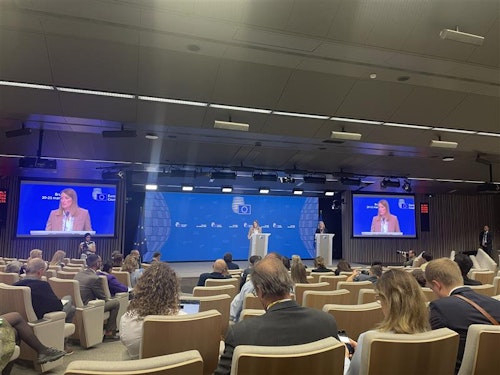
'If we don't lead, we will lag behind', says EU Parliament president
Talk of boosting defence spending across the EU must be linked to discussions on economic growth, European Parliament chief Roberta Metsola told reporters in Brussels.
"If we don't lead, we will lag (behind). A stronger economy requires smart spending," Metsola added.
She said the EU can make a "real difference" within the long-term common budget, known as the Multiannual Financial Framework (MFF), by matching funds to citizens' needs.
The current MFF amounts to €1.2 trillion, or 1% of the bloc's GDP (excluding post-pandemic recovery funds), with most of the money going to agricultural subsidies and policies to tackle the socio-economic gap between the EU's poorest and richest regions.
However, this balance may soon change as priorities such as security and defence increasingly demand more resources to keep the EU competitive on the global stage.
The EU Commission is expected to present a proposal for the next Multiannual Financial Framework (MFF) in July, where the real political battle over which priorities will be funded will begin.
"EU citizens are watching," Metsola stressed, adding that "in times of crisis, leadership matters".
"We will push for meaningful reforms to make the budget simpler, more flexible and adaptable to what is happening," the Parliament chief said.
EU Commission to propose a simpler, policy-focused long-term budget
“The status quo is not an option,” the European Commission said in a communication laying the groundwork for the upcoming proposal on the next long-term budget…
'Urgent action' from EU member states needed on defence: Industry
The Aerospace, Security and Defence Industries Association of Europe (ASD) welcomed the White Paper on defence released on Wednesday but called for "urgent action" from EU member states, warning that "the industry is at a critical juncture" following decades of underinvestment.
ASD, which represents 4,000 companies and 98% of the industry’s total turnover, said in a statement that it supports the Commission's call for more collaborative procurement but urged governments to place orders with European companies in order to "reduce critical dependencies and strengthen Europe’s security of supply and freedom of action".
The pan-European association had previously said that a so-called European preference for defence spending is an "imperative".
ASD also welcomed measures to guarantee security of supply for essential raw materials and components, to enhance access to finance, especially for SMEs, and to cut red tape, saying it looks forward to the upcoming Strategic Dialogue and Defence Omnibus Simplification.
"Time is of essence. We therefore call upon all relevant stakeholders at EU and national level to act with speed, including to rapidly implement the proposals made in the White Paper," the statement adds.
Boosting defence spending cannot come at the expense of social policy: Iratxe García
The leader of the Socialists and Democrats group in the European Parliament, Iratxe Garcia, said on Thursday morning that although she supports an increase in the European defence budget, it should lead to cuts in other programmes.
"It's important to send the message that we cannot do more with less or with the same resources," she said.
"We are open and we want to support and increase the European defence budget, but at the same time has to be very clear that we cannot do it cutting resources for the traditional policies as agricultural cohesion. We cannot cut the social policies, the environmental policies and all challenges that we have in this moment in Europe.
"This is clear, if we speak about competitiveness, a Europe with Trump in the White House needs to redefine the European economies," she added.
On Ukraine, Garcia said she asked High Representative Kaja Kallas to present legislation to use the hundreds of billions of euros in Russian immobilised assets in the EU to help finance Ukraine's reconstruction and defence needs.
Ireland’s Taoiseach urges caution on US tariffs, condemns Gaza bombing
Ireland’s Taoiseach Micheál Martin has called for a cautious approach regarding potential US tariffs, pointing out that Europe should wait before reacting.
“The wise thing to do is to await the full presentation from the US [on tariffs] on 2 April and then respond comprehensively,” he told reporters.
When asked whether trade tariffs could lead to higher prices for consumers, households, and businesses, Martin acknowledged the potential economic impact, which is why a careful response is needed.
“I don’t want to pre-empt what our response will be,” he added. “Suffice to say that Europe will have to respond collectively. Ultimately, the Commission has exclusive competence on trade, but it has opened a public consultation on the matter.”
On foreign affairs, Martin strongly condemned the recent bombing in Gaza, calling it “shocking” and lamenting the loss of innocent lives.
“It seems to me to amount to collective punishment of the Palestinians within Gaza. It is quite shocking. It needs to stop. And Europe needs to say ‘stop’ to the killing and the slaughter that’s going on in Gaza at the moment,” he said.
By Gerardo Fortuna.
Analysis: Why the Trump-Zelenskyy call is a (brief) sigh of relief for Europe
Ever since Donald Trump and Vladimir Putin held their phone call on 12 February and agreed to "immediately" launch negotiations to end Russia's war on Ukraine, Europe has been in a sort of panic mode, to put it mildly.
Trump's embrace of Russia's talking points and his clash with Volodymyr Zelenksyy at the Oval Office seemed to realise Europe's worst nightmare: that Washington and Moscow would thrash out a deal behind everybody's back and then force Kyiv to accept, regardless of the terms. Trump's decision to temporarily pause military aid and intelligence sharing with Ukraine further deepened the anxiety.
But the latest phone call between Trump and Zelenskyy showed a distinctly positive tone. The conversation was described as "fantastic" by the White House and encompassed a wide range of topics, including the issue of the Ukrainian children abducted by Russian forces. In a notable turnaround, Trump agreed to help Zelenskyy find additional air defence systems to protect civilian infrastructure, effectively rejecting Putin's demand that military assistance should be stopped. Trump also floated the idea of American ownership of the Zaporizhzhia Nuclear Power Plant, which currently remains under Russian occupation.
The improvement of relations between Trump and Zelenskyy has allowed Brussels to breathe, at least momentarily, a much-welcome sigh of relief. "For us, politicians, we need to keep dialogue open," Latvia's prime minister said on Thursday. However, Trump's diplomacy is notoriously unpredictable, so a new turn for the worse cannot (and should not) be completely ruled out.
Important for EU to continue support Ukraine: Scholz
Germany's outgoing Chancellor, Olaf Scholz, told reporters that member states must continue to provide "significant support to Ukraine".
"It is crucial that Ukraine remains an independent, sovereign and democratic nation, that it can continue on its path to the European Union and that it has its own strong army even after a peace agreement," he said.
He added that the Bundestag's decision on Tuesday to amend the constitution to deviate from enshrined fiscal rules and to unlock €500 billion of state borrowing for defence and infrastructure through amending the country's constitutionally enshrined fiscal rules will help towards that goal.
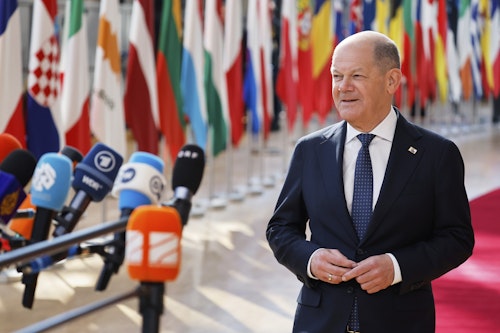
The package still needs to be approved by Germany's upper house, the Bundesrat, on Friday.
He also talked about the bloc's competitiveness, which leaders are set to discuss today, and in particular "the question of how we can also make it possible for us to grow by further developing the Capital Markets Union".
Photo credit: AP Photo/Geert Vanden Wijngaert
Spain's position on defence doesn't convince Brussels
As my colleague Paula just reported, Spanish Prime Minister Pedro Sánchez has struck a contrarian note upon arriving at the EU summit.
Sánchez spoke against the term "rearm" and said the debate on defence spending should have a broader "security" angle to include border controls, terrorism, cyber-attacks and hybrid warfare. Prior to the summit, the premier had also pointed to climate action as an area that should be added to security.
But in Brussels, Spain's all-encompassing view is raising plenty of eyebrows.
Officials and diplomats see Sánchez's position as effectively an excuse to avoid ramping up expenditure on military hardware, such as artillery, air defence systems, drones and ammunition. These are all areas that the European Commission has identified as a priority in its White Paper on Defence.
Brussels prefers to keep a narrow definition of defence, with strict criteria, to channel public and private funds into military goods that can help the EU deter Russian aggression. If these criteria are too excessively broadened, member states may risk spending money on goods that do not actually contribute to this deterrence, officials warn.
The fact that Spain is among NATO's laggards on defence spending isn't helping Sánchez's cause.
Photo Credit: European Union.
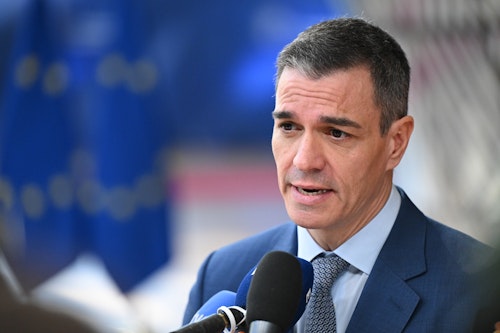
Spanish PM rejects von der Leyen's 'rearming Europe' wording
Spanish Prime Minister Pedro Sanchez disagrees with von der Leyen's decision to call the Commission's defence ramp-up proposal "ReArm Europe".
"I think we need to address our citizens in a different way," Sanchez told reporters.
Spain and Italy are currently pushing for a broader definition of what constitutes defence spending, so they can benefit from the loosening of fiscal rules approved last year to fund other areas related to security and crisis preparedness.
Sanchez said his country was keen to increase defence spending, but also to include investment in security in the current plan to overhaul Europe's defence.
"It is important to take into account that the challenges we face in the southern neighbourhood, which are a bit different to the ones that the eastern flank faces, and this means that we need to strengthen our border controls," Sanchez argued.
The Socialist leader also mentioned the need to strengthen Europe's capabilities to fight terrorism, cyber-attacks and hybrid attacks.
"We need more Europe, and more Europe means more social policy, more relations with other regional blocs, more involvement in multilateral debates, and logically it also means more security and defence," he said.
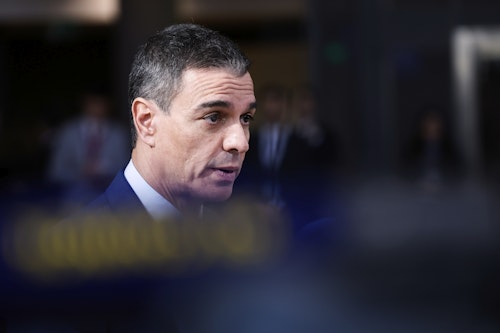
Source: AP
Kallas' plan for Ukraine is 'ancillary project': Tajani
EU foreign affairs chief Kaja Kallas' initiative to mobilise up to €40 billion in military support for Ukraine seems to be "an ancillary project", Italy's Defence Minister and Deputy Prime Minister said.
"Let’s see what it will be about. I believe it will be an optional plan [for Member States]. I believe that many countries want really to understand what this is in concrete terms. But I think we need a strategy, not a series of extemporaneous initiatives", Antonio Tajani told journalists after the pre-summit meeting of the European People's Party held in Brussels.
Kallas' plan seeks to fulfill Ukraine's priority needs to fight Russia's aggression, with special emphasis on artillery ammunition, air defence systems, missiles, drones and fighter jets.
Tajani also insisted on the long-term perspective of a common EU army and doubled down on the need to look at the Southern flank of Europe. "There are several dangers in Africa nowadays, like terrorism and the increased presence of Iranians, Chinese and Russians. So we have to look carefully also at the threats coming from the South are not only from the East".
Kallas proposed delivering €5 billion worth of ammunition to Ukraine
The EU needs to move beyond words and take concrete steps to further support Ukraine, the bloc's top diplomat Kaja Kallas told reporters as she entered the European Council.
Kallas welcomed US President Donald Trump's announcement that his administration is trying to find additional air defence systems for Ukraine.
The EU's top diplomat also proposed an initiative to deliver €5 billion worth of large-calibre artillery ammunition to Ukraine.
"We are helping Ukraine now because the stronger they are on the battlefield, the stronger they are behind the negotiating table," she said.
'Putin hasn't changed his goals,' says Estonian Prime Minister
Vladimir Putin "has not changed his goals," says Estonian Prime Minister Kristen Michal.
"We know what Russia is all about," he told reporters in a short doorstep. "We know that everything that’s happening in Ukraine can be happening all over Europe and influencing European and NATO countries."
During his phone call with Donald Trump earlier this week, Putin demanded a "complete" halt of military supplies for Ukraine, which EU leaders are set to reject in their joint conclusions today.
Michal said Estonia would spend "at least" 5% of its GDP on defence as a new target. He welcomed the Rearm Europe plan presented by the European Commission, which seeks to mobilise up to €800 billion in military expenditure and called for a new programme based on common grants. So far, the Commission has only proposed low-interest loans.
'Good starting point, but more ambitions needed': Top liberal MEP says
Speaking at the liberal meeting ahead of the EU Summit, Renew Europe group president Valérie Hayer stressed that recent developments show the United States' commitment to European security can no longer be taken for granted, Euronews' Gerardo Fortuna reports.
In this context, EU liberals welcome the European Commission's White Paper on Defence to achieve defence readiness by 2030 and see it as "a good starting point".
"But we could be even more ambitious," Hayer said, calling on European leaders to take concrete steps on the "Buy European" principle and to make substantial progress on the so-called Eurobonds—meaning grants for member states.
However, issuing common debt for defence is still perceived by "frugal" member states as a no-go.
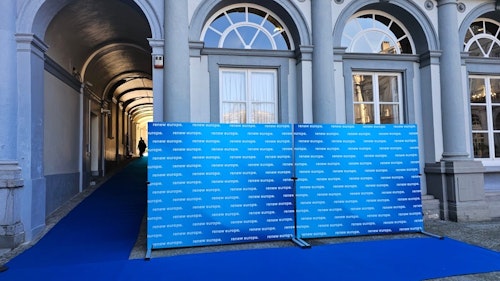
The EU summit begins
The EU summit has officially begun, with most leaders already present in the room.
The discussion kicks off with an address by Roberta Metsola, the president of the European Parliament.
Stay tuned for more updates!
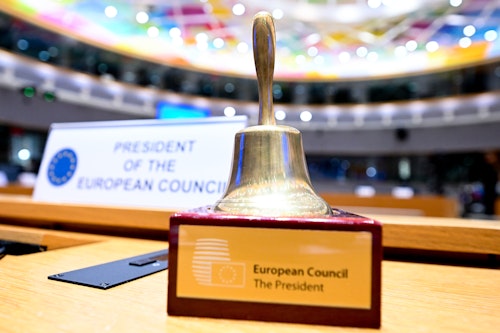
Working together on defence 'more important than the money': Luxembourg
Luc Frieden, the leader of the Grand Duchy of Luxembourg, called for a simplification of regulations and rules for defence as he arrived at the summit.
The White Paper for defence "goes in the right direction", Frieden said, adding that it's "important that we reduce regulation" and that "we make it simpler" for companies to invest, especially in cross-border projects.
The financing proposals and sums they can unleash "are already quite ambitious" but ensuring member states "do more things together" is "more important than the money", he added.
"We need a single market of defence. It’s important, we need more interoperability, we need to buy and produce more European but all that within NATO, together with our American ally," he said.
The Commission is set to put forward a simplification omnibus for the defence industry in June, it said on Wednesday as it unveiled the White Paper. The Omnibus will be released after the EU's executive holds a Strategic Dialogue with the industry.
Pre-summit meeting on migration going on
As we told you, the meeting on migration co-hosted by the Netherlands, Italy and Denmark is currently underway ahead of the summit.
Around the table, we see like-minded countries, such as the Czech Republic, Malta, Sweden and Belgium, who wish to explore so-called "innovative solutions" to curb irregular migration, a term usually associated with outsourcing. Also present in the room is Ursula von der Leyen, the president of the European Commission. Her executive recently proposed a new regulation that, if approved, will enable member states to strike deals with non-EU countries to build overseas centres where rejected asylum seekers could be transferred. This marks a major turning point in migration policy: until now, outsourcing was considered a taboo in contradiction with EU and international law.
Photo Credit: European Union.
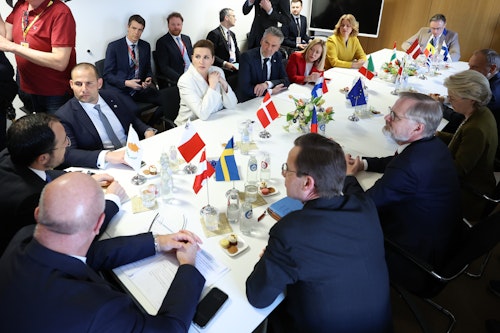
Netherlands against more joint borrowing for defence: Schoof
Dutch Prime Minister Dick Schoof said the proposals included in the White Paper to finance a European defence production ramp-up is "already a tour de force" and cautioned against more joint borrowing.
He said member states should focus on how to simplify procurement rules so they can acquire jointly faster, telling reporters he has been in close contact with his Italian and Belgian counterparts in recent weeks "to see how we can actually make our defence industry work together."
The Dutch government is also "busy" looking at how to strengthen the country's defence and boost defence spending but is doing so ahead of discussions to be held amongst leaders of NATO members in June to raise the mandatory threshold for defence spending.
NATO allies are currently required to spend a minimum of 2% of GDP on defence, although several European countries continue to miss the mark.
On discussions between Russia and the US on a possible ceasefire in Ukraine, he said Europe will need "very firm" commitments from Moscow.
Russia's demand that Western allies freeze assistance to Ukraine during a ceasefire is "not negotiable for me", Schoof said.
Latvia open to more financing for defence
We have more from Evika Siliņa, the Latvian prime minister, who just called for new solutions to ramp up defence spending across the European Union. The European Commission has proposed a new plan to mobilise up to €800 billion in additional investments, including a €150 billion programme of low-interest loans. The initiative will be among the main topics of today's summit.
The multi-billion plan, though, does not include common borrowing for grants, as some member states would have liked to see.
"The proposal is the first step," Siliņa said. "We're open for more discussions (on) how we can find even more finances, how we can get Europe to be more competitive."
The premier said Europe should prepare for "different kinds of risks" and stand ready to deter a potential Russian attack, which recent studies have said could happen by 2030.
"If Europe is stronger it’s much harder to (attempt) any attacks on Europe," Siliņa said. "We need strong goals for 2030, which we need to achieve."
EU should increase pressure on Russia, says Lithuanian President
“We should increase the pressure on Russia, imposing the 17th package of sanctions, including LNG imports, and more banks,” the President of Lithuania, Gitanas Nausėda, said upon arriving at the summit in Brussels.
Lithuania also reiterated its hope for Ukraine's possible entry into the European Union as a fully-fledged member to be set to 1 January 2030.
“It would encourage our friends, Ukrainians, to proceed faster because they know their ability to implement all the necessary reforms, even under very complicated circumstances during the war,” Nausėda argued.
He also welcomed von der Leyen’s €800 billion plan to rearm Europe: “We have to rearm ourselves, because otherwise we will be the second next victim of Russian aggression”.
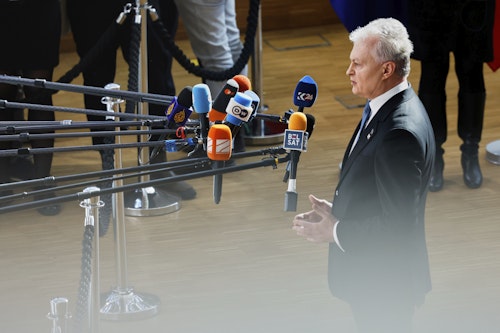
Source: AP Photo/Geert Vanden Wijngaert
Ukraine should be EU member by 2030: Finland's Orpo
Finnish leader Petteri Orpo urged the EU to "continue to support Ukraine militarily and politically" as he arrived at the summit, especially over its bid to join the EU.
Orpo, who received Ukrainian President Volodymyr Zelenskyy in Helsinki on Wednesday, added: "Ukraine, they really want to be a member of the EU, they want to be one of us and that is why we have to help them and support them on their path to membership, as soon as possible, latest 2030."
Ukraine's progress in the membership process is currently being held up by Hungary, which opposes the opening of talks for the first cluster of chapters.
Orpo also told reporters that Finland "strongly" supports the initiative put forward by High Representative Kaja Kallas to boost short-term military support to Ukraine.
Far-right leaders oppose joint borrowing and common debt
Leaders of the far-right Patriots for Europe party rejected the idea of joint borrowing and common debt to finance a defence production ramp-up during a meeting in Brussels ahead of the European Council summit in Brussels.
Defence must remain a national prerogative and can “under no circumstances” be delegated to another level of government, they said in a statement.
“The leaders are in favour of strengthening the defence capabilities of member states, based on national competences, and in accordance with each nation’s needs to defend their borders, their territories and, overall, their sovereignty,” they added.
Patriot leaders also reiterated their opposition to key EU policies such as the Migration Pact or the Green Deal.
EU should be 'more ambitious' on funding for defence and offer grants: Mitsotakis
Greek Prime Minister Kyriakos Mitsotakis said upon arrival that he is "happy" with the proposals included in the White Paper on defence, in particular the activation of the national escape clause to allow for more fiscal flexibility for defence spending and the creation of the SAFE instrument.
"We hope that it will soon be approved by our ministers of finance," he told reporters.
But he also said leaders "need to have a serious discussion" on whether to "move in a more ambitious direction towards the provision of grants" and not just loans so that member states can "make the important investment they need to do in order to ensure our common European defence reaches a point which we aspire".
"I would urge us to be even more ambitious although I think it (the White Paper) is an excellent first step," Mitsotakis said.
Zelenskyy-Trump talks are going 'pretty well,' says Latvian Prime Minister
The negotiations between Volodymyr Zelenskyy and Donald Trump are going "pretty well," Evika Siliņa, the prime minister of Latvia, said upon arriving at the summit.
"They have negotiated very well," Siliņa told reporters, referring to yesterday's phone call between the two men. "For us politicians, we need to keep dialogue open."
Despite Trump's disruptive policies and embrace of Russia's talking points, Siliņa defended the US as "our transatlantic partner" and stressed the need to keep "working together."
"The US needs a strong Europe and Europe needs a strong US," she said.
Details on the pre-summit migration meeting
The leaders of Italy, the Netherlands, and Denmark - Giorgia Meloni, Dick Schoof, and Mette Frederiksen - are co-chairing a meeting on migration before the summit officially kicks off.
It will be attended by the leaders of Austria, Belgium, Cyprus, Czech Republic, Denmark, Finland, Greece, Hungary, Latvia, Malta, the Netherlands, Poland, Sweden and the Czech Republic.
Health, education, social cohesion will not be left behind, Cypriot President told Euronews
Health, education and social cohesion are key priorities for the European Union and they will not be left behind "under any circumstances", Nikos Christodoulides, president of the Republic of Cyprus, told Euronews' Maria Psara in an interview.
"By investing in defence, we are investing in the European defence industry, we are creating new jobs for European citizens. This helps the European Union in general, the economies of the member states," he added.
Christodoulides said that the forthcoming increase in defence spending does not pose a dilemma for the EU's other major priorities.
"We are not strengthening our defence, our security, because we have war ambitions," he argued, adding that "we have an obligation to do it to protect our borders, to protect our citizens".
Πρόεδρος Χριστοδουλίδης: «Σημαντικά όσα έγιναν, αλλά και όσα αποφύγαμε» https://t.co/C6dkzV4WsR
— maria psara (@mapsara) March 20, 2025
Μια συνέντευξη- απολογισμός για όσα έγιναν στη Γενεύη, αλλά και όσα θα γίνουν στη Σύνοδο Κορυφής #EUCO @Christodulides
'These are decisive days for Europe’: EU Commission president says
Competitiveness will top the EU’s agenda during today’s meeting of leaders in Brussels.
These are "decisive days for Europe", EU Commission President Ursula von der Leyen told reporters ahead of the European People's Party (EPP) meeting, as Euronews' Vincenzo Genovese reports from the ground.
Von der Leyen wants to discuss with EU leaders how to achieve a lasting peace in Ukraine, but above all the challenges facing the bloc's competitiveness and security agenda.
The White Paper on the Future of European Defence, presented yesterday, will also be the "centre of discussion" on how to achieve the defence readiness needed to protect the continent by 2030.
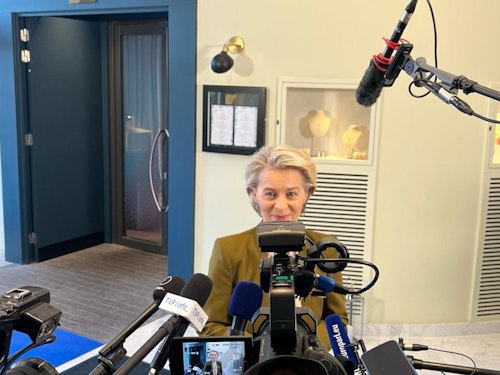
Here's what was in the highly-anticipated White Paper on defence
The eagerly-awaited White Paper on the future of European defence, renamed 'Readiness 2030', was finally unveiled on Wednesday but most of what it contained had already been released under Ursula von der Leyen's ReArm Europe proposal.
So leaders who had hoped the Commission might put forward new, innovative proposals for financing would have been disappointed.
The only fresh proposal on the money front was about waiving VAT for joint purchases made through the new SAFE instrument through which the Commission will raise money on the markets to loan it to member states.
Here's your essential recap of the strategy that leaders will start discussing today:
Much-trailed EU defence strategy fails to outline new funding options
The European Commission’s ReArm Europe proposal aims to see member states unleash up to €800 billion in defence spending over the next four years. #EuropeNews
Welcome to the special coverage of the EU summit in Brussels!
Welcome to another Euronews Live Blog! I'm Paula Soler, defence and finance correspondent, and my colleagues Alice Tidey, Jorge Liboreiro and Romane Armangau will be guiding you through the day.
It's a very grey Thursday in Brussels as EU leaders gather for yet another summit to discuss competitiveness, Russia's war on Ukraine, the EU's long-term budget (2028-34), migration and the recently announced €800 billion plan to rearm Europe.
Buckle up, because the summit could last until Friday!












